unit 4 导学案 1 (2)
东明一中高一必修三英语unit4导学案2
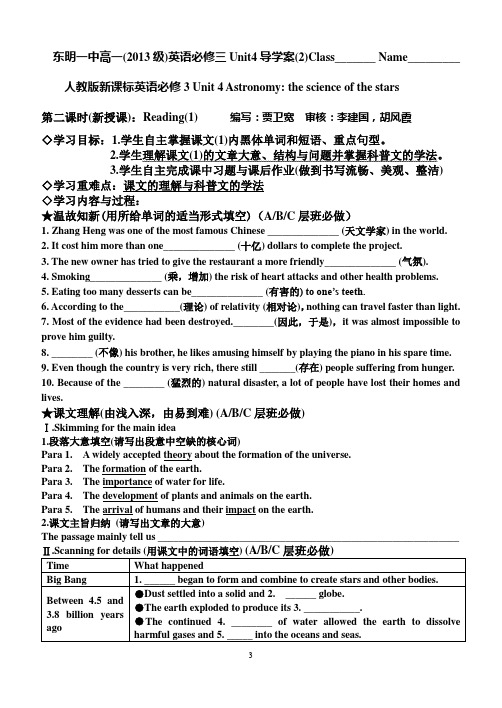
东明一中高一(2013级)英语必修三Unit4导学案(2)Class_______ Name_________ 人教版新课标英语必修3 Unit 4 Astronomy: the science of the stars第二课时(新授课):Reading(1)编写:贾卫宽审核:李建国,胡风霞◇学习目标:1.学生自主掌握课文(1)内黑体单词和短语、重点句型。
2.学生理解课文(1)的文章大意、结构与问题并掌握科普文的学法。
3.学生自主完成课中习题与课后作业(做到书写流畅、美观、整洁)◇学习重难点:课文的理解与科普文的学法◇学习内容与过程:★温故知新(用所给单词的适当形式填空)(A/B/C层班必做)1. Zhang Heng was one of the most famous Chinese ______________ (天文学家) in the world.2. It cost him more than one______________ (十亿) dollars to complete the project.3. The new owner has tried to give the restaurant a more friendly______________ (气氛).4. Smoking______________ (乘,增加) the risk of heart attacks and other health problems.5. Eating too many desserts can be______________ (有害的) to one’s teeth.6. According to the___________(理论) of relativity (相对论),nothing can travel faster than light.7. Most of the evidence had been destroyed.________(因此,于是),it was almost impossible to prove him guilty.8. ________ (不像) his brother, he likes amusing himself by playing the piano in his spare time.9. Even though the country is very rich, there still _______(存在) people suffering from hunger.10. Because of the ________ (猛烈的) natural disaster, a lot of people have lost their homes and lives.★课文理解(由浅入深,由易到难) (A/B/C层班必做)Ⅰ.Skimming for the main idea1.段落大意填空(请写出段意中空缺的核心词)Para 1. A widely accepted theory about the formation of the universe.Para 2. The formation of the earth.Para 3. The importance of water for life.Para 4. The development of plants and animals on the earth.Para 5. The arrival of humans and their impact on the earth.2.课文主旨归纳(请写出文章的大意)The passage mainly tell us ___________________________________________________________Ⅲ. Careful reading for comprehension (A/B层班必做;C层班选做)1. How did water come into being on the earth? (Within 15 words)___________________________________________________________2. In the sentence “They were in time to produce... atmosphere” in Paragraph 2, what does the word “They” refer to? (Within 3 words)___________________________________________________________3. What’s the significance of the presence of water on the earth? (Within 15 words)___________________________________________________________4. Why are mammals different from all life forms in the past? (Within 15 words)___________________________________________________________5. Why do many scientists believe the earth may become too hot to live on? (Within 25 words)__________________________________________________________________________________ ___________________________________________________________Ⅴ.课文升华(读后讨论)Q: Since we have only one earth,what should we do for our earth?huge animals (dinosaurs)5._____________ to6. ______early 7. _________ and9._____beingsA:_____________________________________________________________________ _______________________________________________________________________ _______________________________________________________________________ ★阅读巩固:Ⅴ.根据课文内容完成下面语法填空,注意单词拼写和词语用法(A/B/C层班必做)As the result of "big bang", the violent earth slowly settled into a globe 1.___(move) around the sun. the gasses which were to make the earth's 2.___(大气层)came into being from the explosion of the dust ball, with water 3.___(follow) them while the earth cooled down. it allowed the beginning for life. many millions of years 4.___, the first 5.___(极度的) small plants began to appear 6.___the surface of the water, 7.___(繁殖) and filling the sea and oceans, which encouraged the later development of early shellfish and all sorts of fish. as time passed, green plants taking carbon dioxide and producing 8.___(氧气)came to land and grew into forest. later the chains of lives continued, such as insects, amphibians, reptiles, dinosaurs and mammals, the typical of 9.___is human being. they don't only do 10.___to the earth but cause damage to it.★课后作业(请认真书写)(A/B/C层班必做)Ⅰ. 短语速记(写出下列汉语意思对应的英语短语)1.根据;按照____________9.也,又____________2.以…开始____________10.下蛋____________3.往/从各个方向__________11.仍然是个谜____________4.及时,终于____________12.产生;分娩____________5.冷却下来____________13.轮到某人,接着____________6.允许…做某事___________14.阻止,制止____________7.连锁反应____________15.因为,由于…的原因____________8.用…充满…____________16.依靠;取决于____________Ⅱ.佳句背默(每空一词) (A/B /C层班必做)1.随后它会变成什么没有人知道,直到38~45亿年前,这团尘埃才慢慢地形成一个固体的球状物。
部编RJ人教版PEP新目标 初三九年级英语 上册第一学期秋季(优质导学案)Unit 4 导学案
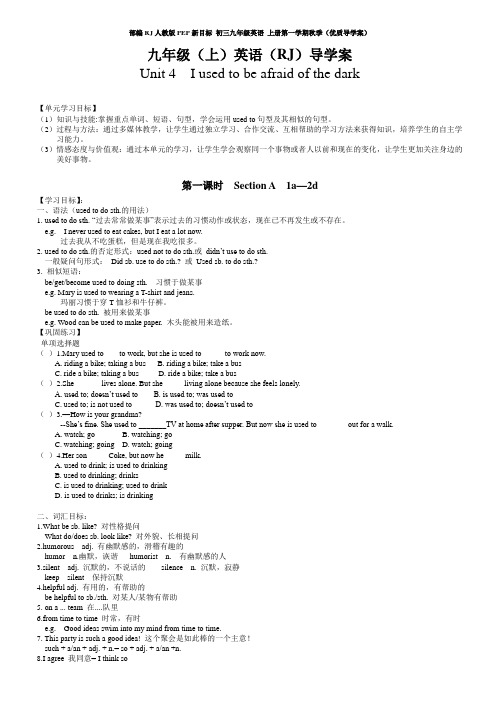
九年级(上)英语(RJ)导学案Unit 4 I used to be afraid of the dark【单元学习目标】(1)知识与技能:掌握重点单词、短语、句型,学会运用used to句型及其相似的句型。
(2)过程与方法:通过多媒体教学,让学生通过独立学习、合作交流、互相帮助的学习方法来获得知识,培养学生的自主学习能力。
(3)情感态度与价值观:通过本单元的学习,让学生学会观察同一个事物或者人以前和现在的变化,让学生更加关注身边的美好事物。
第一课时Section A 1a—2d【学习目标】:一、语法(used to do sth.的用法)1. used to do sth. “过去常常做某事”表示过去的习惯动作或状态,现在已不再发生或不存在。
e.g. I never used to eat cakes, but I eat a lot now.过去我从不吃蛋糕,但是现在我吃很多。
2. used to do sth.的否定形式:used not to do sth.或didn’t use to do sth.一般疑问句形式:Did sb. use to do sth.? 或Used sb. to do sth.?3. 相似短语:be/get/become used to doing sth. 习惯于做某事e.g. Mary is used to wearing a T-shirt and jeans.玛丽习惯于穿T恤衫和牛仔裤。
be used to do sth. 被用来做某事e.g. Wood can be used to make paper. 木头能被用来造纸。
【巩固练习】单项选择题()1.Mary used to ___ to work, but she is used to _____ to work now.A. riding a bike; taking a busB. riding a bike; take a busC. ride a bike; taking a busD. ride a bike; take a bus()2.She ______ lives alone. But she_____ living alone because she feels lonely.A. used to; doesn’t used toB. is used to; was used toC. used to; is not used toD. was used to; doesn’t used to()3.—How is your grandma?--She’s fine. She used to _______TV at home after supper. But now she is used to _______ out for a walk.A. watch; goB. watching; goC. watching; goingD. watch; going()4.Her son _____Coke, but now he _____milk.A. used to drink; is used to drinkingB. used to drinking; drinksC. is used to drinking; used to drinkD. is used to drinks; is drinking二、词汇目标:1.What be sb. like? 对性格提问What do/does sb. look like? 对外貌、长相提问2.humorous adj. 有幽默感的,滑稽有趣的humor n.幽默,诙谐humorist n. 有幽默感的人3.silent adj. 沉默的,不说话的silence n. 沉默,寂静keep silent 保持沉默4.helpful adj. 有用的,有帮助的be helpful to sb./sth. 对某人/某物有帮助5. on a ... team 在....队里6.from time to time 时常,有时e.g. Good ideas swim into my mind from time to time.7. This party is such a good idea! 这个聚会是如此棒的一个主意!such + a/an + adj. + n.= so + adj. + a/an +n.8.I agree 我同意= I think so表示不同意时用I don’t agree 或I disagree9.It’s been three years since we last saw our primary school classmates.自从我们上次小学同学见面以来已经有三年的时间了。
四年级英语第4单元自学导学案及答案

四年级英语第4单元⾃学导学案及答案四年级英语⾃学导学案⼀学习内容:Unit4 At the farm A Let’s talk学习⽬标:1、我能听、说、认读句型:Are these carrots? Yes, they are./ No,they aren’t. What are these? They ’re tomatoes.2、我能够在情境中恰当运⽤句型What are these? They’ re …询问并回答各种蔬菜或动物的名称。
3、我能够在情境中恰当运⽤句型They ’re so big/long/cute…描述物品特点。
学习步骤:⼀、新知预习1、请翻开课本P38,Let’s talk听录⾳3遍,请认真听并回答问题:What colour are these tomatoes?They are .2、跟读对话录⾳2遍。
写出下列单词的中⽂意思:these tomato carrot3、⼤声朗读课⽂两遍并回答问题:Are these carrots?What are these?4、Let’s play 跟读录⾳两遍,⼤声朗读两遍并试着理解对话的意思。
⼆、知识点⼩结:复数复数复数1. this →these carrot →carrots tomato→tomatoes2.询问近处的这些东西是什么时,⽤句型:What are these?答语:They are……Are these……? 肯定回答:Yes,they are. 否定回答:No, they aren’t.三、⾃我检测:(⼀)单项选择( )1. I like .A. carrots B . carrotes C. carrot( )2. --What are these? -- are carrots.A. These B .Those C. They( )3.The tomatoes yellow.A.is B .are C. am(⼆)连词成句(1) Are tomatoes these ?(2) are What these ?(3) big They’re so !(4)carrots are They .三、选择正确的翻译( )1.这些是什么?A. What are they?B. What are these?( )2.这些是西红柿吗?A. Are these tomatos?B. Are these tomatoes?( )3.不,它们不是。
八年级英语Unit 4导学案已核(全)
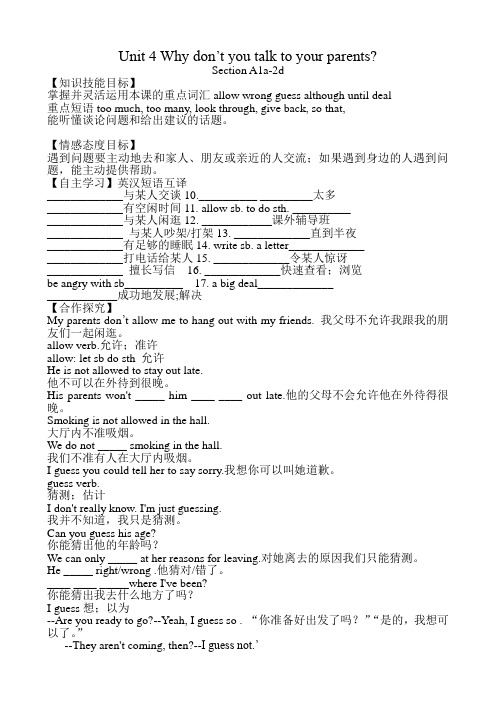
Unit 4 Why don‘t you talk to your parents?Section A1a-2d【知识技能目标】掌握并灵活运用本课的重点词汇allow wrong guess although until deal重点短语too much, too many, look through, give back, so that,能听懂谈论问题和给出建议的话题。
【情感态度目标】遇到问题要主动地去和家人、朋友或亲近的人交流;如果遇到身边的人遇到问题,能主动提供帮助。
【自主学习】英汉短语互译_____________与某人交谈10.__________ _________太多_____________有空闲时间11. allow sb. to do sth. _______________________与某人闲逛12. ____________课外辅导班_____________ 与某人吵架/打架13. _____________直到半夜_____________有足够的睡眠14. write sb. a letter__________________________打电话给某人15. _____________令某人惊讶_____________ 擅长写信16. _____________快速查看;浏览be angry with sb__________ 17. a big deal_________________________成功地发展;解决【合作探究】My parents don‘t allow me to hang out with my friends. 我父母不允许我跟我的朋友们一起闲逛。
allow verb.允许;准许allow: let sb do sth 允许He is not allowed to stay out late.他不可以在外待到很晚。
His parents won't _____ him ____ ____ out late.他的父母不会允许他在外待得很晚。
Unit 4 sectionB(1a-2c)导学案

Unit 4 what’s the best movie theater?SectionB(1a—2c)设计者:申爱玲审核:英语组时间:2013年10月10日星期四学习目标1.掌握单词、短语:creative,loud,performer ,talent show. have one thing in common, That's up to you, For example,play a role , in fact 2.掌握句型:1.My sister Alice is the funniest person I know.2.What’s the best……?最好的……是什么?3.Which is the best……?最好的……是哪个?4.Who/What do you think is the funniest……?你认为谁/什么是最有趣的3.继续学习形容词副词最高级的用法4. .运用比较级描述人物的才能一.自主学习(Self-learning)I.归纳梳理快乐学习A.总结形容词副词的比较等级的变化B.1.仔细朗读单词,完成1a2.完成1b造句,用1a中的单词,和你的搭档谈论你了解的人(运用形容词和副词的最高级)C.听听练练(1c—1d)①在1c中要看清这5个图,他们分别在做什么才艺展示,写出相应图的人名。
②在1d中,要求你听出人们是怎样评价这些表演者的,要注意听形容词如果在做听力时,只要能做到心中有数,相信你一定会听得很成功。
D.小组合作Task1:快速默读课文,回答问题Which three talent shows are mentioned ?Task2:小组讨论核对答案。
Task3:仔细阅读2b课文,勾画记忆课文短语并翻译is good at something be interesting to +Vwatch other people +V get more and more popularBe like American Idol and America's Got Talent around the world such as and so onChina's Got Talent the lives of the performers are made uptry to look for the best singersthe most talented dancers the most exciting magiciansthe funniest actors All kinds of peopleplay the piano the best sing the most beautifullyThat's up to you to decide take sth seriouslygets a very good prize. enjoys watching these shows have one thing in common For examplein fact play a role in deciding the winner be fun to watch A way to make their dreams come true2、在原文中找出2c的句子3、根据要求完成2c4、检查答案II.合作互动(Cooperative Learning)小组活动:1.根据1d中的信息,小组成员自编对话,完成1e部分的内容。
凤州初级中学九年级英语Unit4导学案(第一、二课时)
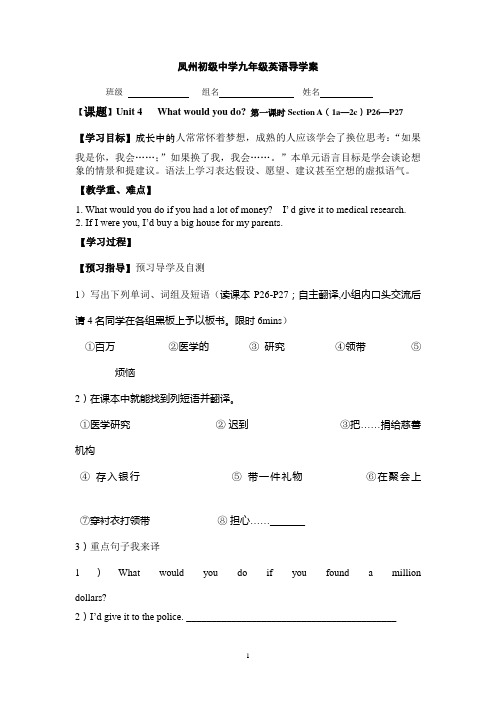
凤州初级中学九年级英语导学案班级组名姓名【课题】Unit 4 What would you do?第一课时Section A(1a—2c)P26—P27【学习目标】成长中的人常常怀着梦想,成熟的人应该学会了换位思考:“如果我是你,我会……;”如果换了我,我会……。
”本单元语言目标是学会谈论想象的情景和提建议。
语法上学习表达假设、愿望、建议甚至空想的虚拟语气。
【教学重、难点】1. What would you do if you had a lot of money? I’ d give it to medical research.2. If I were you, I’d buy a big house for my parents.【学习过程】【预习指导】预习导学及自测1)写出下列单词、词组及短语(读课本P26-P27;自主翻译,小组内口头交流后请4名同学在各组黑板上予以板书。
限时6mins)①百万_______ ②医学的_______ ③研究_______ ④领带______ ⑤烦恼_____2)在课本中就能找到列短语并翻译。
①医学研究 _______ ②迟到_______ ③把……捐给慈善机构 _______④存入银行_______ ⑤带一件礼物 _______ ⑥在聚会上_______ ⑦穿衬衣打领带_______ ⑧担心……_______3)重点句子我来译1)What would you do if you found a million dollars?__________________________________2)I’d give it to the police. __________________________________________ 3.) If I were you, I’d buy some n ew clothes. _________________________【合作探究】1)新课导入Do you have money? Do you want to have lots of money?If I had lots of money, I would do a lot of things.2)听力练习1 b 听录音将图画标上正确的顺序。
四年级英语第4单元自学导学案及答案
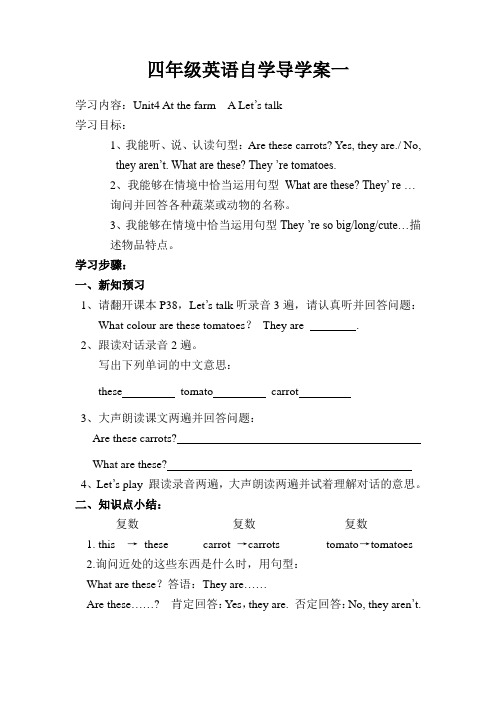
四年级英语自学导学案一学习内容:Unit4 At the farm A Let’s talk学习目标:1、我能听、说、认读句型:Are these carrots? Yes, they are./ No,they aren’t. What are these? They ’re tomatoes.2、我能够在情境中恰当运用句型What are these? They’ re …询问并回答各种蔬菜或动物的名称。
3、我能够在情境中恰当运用句型They ’re so big/long/cute…描述物品特点。
学习步骤:一、新知预习1、请翻开课本P38,Let’s talk听录音3遍,请认真听并回答问题:What colour are these tomatoes?They are .2、跟读对话录音2遍。
写出下列单词的中文意思:these tomato carrot3、大声朗读课文两遍并回答问题:Are these carrots?What are these?4、Let’s play 跟读录音两遍,大声朗读两遍并试着理解对话的意思。
二、知识点小结:复数复数复数1. this →these carrot →carrots tomato→tomatoes2.询问近处的这些东西是什么时,用句型:What are these?答语:They are……Are these……? 肯定回答:Yes,they are. 否定回答:No, they aren’t.三、自我检测:(一)单项选择( )1. I like .A. carrots B . carrotes C. carrot( )2. --What are these? -- are carrots.A. These B .Those C. They( )3.The tomatoes yellow.A.is B .are C. am(二)连词成句(1) Are tomatoes these ?(2) are What these ?(3) big They’re so !(4)carrots are They .三、选择正确的翻译( )1.这些是什么?A. What are they?B. What are these?( )2.这些是西红柿吗?A. Are these tomatos?B. Are these tomatoes?( )3.不,它们不是。
八年级英语(上)unit4第一课时导学案(人教版英语八年级)

八年级英语(上)unit4第一课时导学案(人教版英语八年级)年级 Grade 8学科英语主备教师授课教师备课组长八年级备课组课题 Unit 4 Section A (1a-2c) 课型新授课第1课时第周学习目标学习运用一般现在时谈论怎样到达基地,掌握How 引导的特殊疑问句及回答。
重点难点 1.单词及短语:subway, train, forty, fifty, seventy, eighty, ninety, hundred, minute, take, by bus, How long.2.交际用语:How do you get to school? I ride my bike.How long does it take? It takes about forty minutes.学法指导 1. Listening, reading and speaking.2. Role playing (pair work and groupwork)教学媒体多媒体,录音机教学活动一、【自主学习】1.复习检测:I can do乘公交车骑自行车步行走路上学乘火车乘地铁到达四十分钟2.复习:Review the new words of unit 4(听录音跟读)二、【合作探究】(一)读一读, 议一议。
看课本1a,小组合作讨论,完成1a,朗读记忆二遍。
(二)听一听,写一写,读一读1.听录音,完成1b2.听录音,完成2a,2b3.听录音,完成2c,掌握How, How long 引导的特殊疑问句。
再听一遍,学生跟读。
4.pairwork, 仿2d,学生进行小组会话训练。
(三)读一读,议一议学生自读Grammar Focous, 小结重点句型。
①②三、【巩固测评】练习 1: 英汉互译(1)骑车上学(5)take the train(2)到达学校(6)How long(3)大约三十分钟(7)seventy-nine(4)一百八十(8)walk to home练习2:用所给词的适当形式填空。
Unit4 导学案

(5)听录音,根据所听内容选择最佳选项。
1.Who is tidy?
A.Kate B. Gina C. Kate and Gina
2. Where are Kate’s books and tapes?
A.in the bookcase B. in her schoolbag C. on the desk
3、圈出阅读过程中不理解的单词、短语和句型。
4、通过预习,你能正确地使用方位介词来描述你的房间里物品的位置吗?
二、借助媒介,正音操练
1、教师借助媒介,展示图片,通过游戏利用句型Where’s the…?/ Where’re the…?; It’s in/on/under…/ They’re in/ on/under…来让学生复习用方位介词“in/on/under”表述物品位置。
②圈出Kate和Gina分别拥有的物品。
③圈出能表示所在位置的介词。
④根据所找信息,试完成下列表格。
Kate
Gina
Thห้องสมุดไป่ตู้ngs
Where
Things
Where
books and tapes
(3)精读
细读2b,假如你是Kate,试用所学语言根据表格信息介绍你和你的妹妹Gina的房间里的物品及位置。
Eg:I’mKate, and my sister is Gina. I’m tidy, but Gina is not. I have some… They are in/on/under…My…is in/on/under…Gina’s…is in/on/under… Her…are in/on/under…/everywhere
5. Where is Gina’s schoolbag?
Fun Fun English一级 Unit4导学案

一年级英语导学案001
课题:Review the words (Unit4)
课型:Revision 班级:导学教师:学生姓名:时间:
学习目标:(Learning aims ):
读准、读熟12个单词:sofa 、television、picture、coffee table 、stereo、telephone、 VCR、videotape、headphone、air conditioner、curtain、carpet。
学习过程:
第一步(step one):连一连(Exercise)
carpet curtain headphone television air conditioner picture
telephone sofa VCR videotape coffee table stereo
第二步(step two):读一读(Reading)
1、自读:会读P38、39 的12个单词,能理解意思,不懂的标注出来。
2、互读:同桌相互朗读单词,遇到不懂的相互帮忙。
3、跟读:sofa 、television、picture、coffee table 、stereo、VCR、telephone、videotape、headphone、air conditioner、curtain、carpet。
4、抽读:12个单词。
第三步(step three):游戏(game):抢读单词。
教师将学生分成若干组,然后逐个出示单词卡片,学生举手抢答,最先举手的读出单词并说出意思,读对说对的记5分,得分最多组为优胜。
八下unit4导学案

【课题】Unit 4 section A 1a-2c (1课时)【学习目标】1.直接引语变间接引语。
2.掌握新词汇be mad at, soap operas, not…any more, call/ring sb, drinks and snacks, have a surprise , party for sb, go to Martcia‘s house, bring … to …3.掌握直接引语和间接引语的用法。
【重点、难点】直接引语变间接引语。
【导学指导】温故知新小组谈论自己喜欢的电视剧,什么是soap operas ?知识梳理一、句型1. What are some soap operas you know? 你所知道的有哪些肥皂剧?you know是定语从句,修饰前面的名词soap operas2. What are some things that happen on soap operas? 肥皂剧里发生了些什么事?That happen on soap operas 是定语从句,修饰前面的名字something.3. Lana said she wasn‘t mad at Marcia anymore.拉娜说她不再生玛西娅的气了。
be mad at (with) sb. 对某人恼火be mad at (about) sth. (doing sth.) 对某事恼火 e.g. Mother got mad at (with) me for watching TV for hours.not… anymore不再…… e.g. She didn‘t cry anymore.她不再哭了。
4. bring some books to her house. 给她带来一些书bring sth. to 从(远处)带来,拿来(到近处)而其反义词为:take… to―从(近处)拿(走)到(远处)e.g. Could you bring some water to me? Please take the chair to Jim‘s room.二、直接引语与间接引语1.含义:直接引述别人的话,叫直接引语,一般前后加引号。
仁爱英语九年级Unit4 Topic1导学案
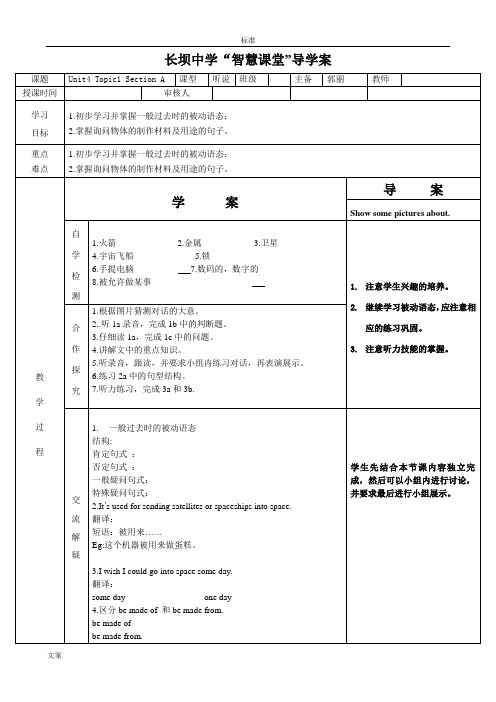
( )2.We all know that paper ___wood.
A. is made of B. is made into C. is made from
( )3.This kind of machine ___in 2006.
A .to learn English B. learning English C. in English
学生先独立思考完成,讲解前学生可以小组内讨论,小组内可互相帮助。
板书
设计
教学反思或后记
安全小贴士
上下楼梯注意安全!
长坝中学“智慧课堂”导学案
课题
Unit4Topic1Section B
课型
听说
学科
11.气球,热气球__________12.枪炮__________
13.机器人__________ 14.键盘__________
1.做阅读训练之前,多指导学生的阅读技巧。
2.可充分利用小组合作,增强学生的学习能力。
3.写作技巧的指导。
合作探究
1.阅读文章之前,回答下列问题。
(1)What is invention?
Show some pictures about.
自学检测
1.火箭___________2.金属__________3.卫星____________
4.宇宙飞船____________5.锁_____________
6.手提电脑___________7.数码的,数字的____________
8.被允许做某事________________________
7.听力练习,完成3a和3b.
人教七年级下册Unit4导学案设计(有答案)
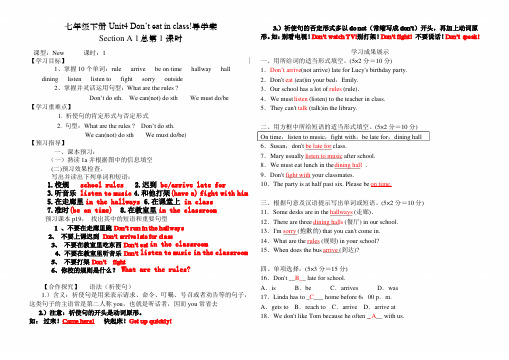
七年级下册Unit4 Don’t eat in class!导学案Section A 1总第1课时课型:New课时:1【学习目标】1、掌握10个单词:rule arrive be on time hallway halldining listen listen to fight sorry outside2、掌握并灵活运用句型:What are the rules ?Don’t do sth.We can(not) do sth We must do/be【学习重难点】1.祈使句的肯定形式与否定形式2.句型:What are the rules ?Don’t do sth.We can(not) do sth We must do/be)【预习指导】一、课本预习:(一)熟读1a并根据图中的信息填空(二)预习效果检查。
写出并读出下列单词和短语:1.校规school rules2.迟到be/arrive late for3.听音乐listen to music4.和他打架(have a)fight with him5.在走廊里in the hallways6.在课堂上 in class7.准时(be on time)8.在教室里in the classroom预习课本p19,找出其中的短语和重要句型1、不要在走廊里跑Don’t run in the hallways2、不要上课迟到Don’t arrive late for class3、不要在教室里吃东西Don’t eat in the classroom4、不要在教室里听音乐Don’t listen to music in the classroom5、不要打架Don’t fight6、你校的规则是什么?What are the rules?【合作探究】语法(祈使句)1.)含义:祈使句是用来表示请求、命令、叮嘱、号召或者劝告等的句子,这类句子的主语常是第二人称you,也就是听话者,因而you常省去2.)注意:祈使句的开头是动词原形。
八年级英语下册 Unit4导学导练 人教新目标版
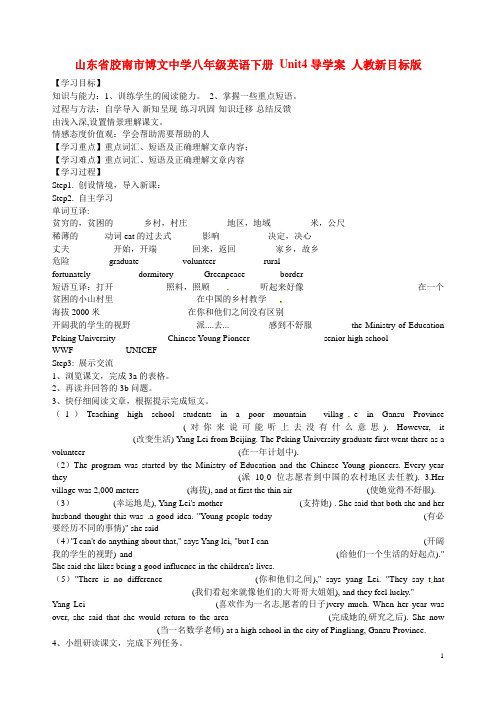
山东省胶南市博文中学八年级英语下册Unit4导学案人教新目标版【学习目标】知识与能力:1、训练学生的阅读能力。
2、掌握一些重点短语。
过程与方法:自学导入-新知呈现-练习巩固-知识迁移-总结反馈由浅入深,设置情景理解课文。
情感态度价值观:学会帮助需要帮助的人【学习重点】重点词汇、短语及正确理解文章内容;【学习难点】重点词汇、短语及正确理解文章内容【学习过程】Step1. 创设情境,导入新课:Step2. 自主学习单词互译:贫穷的,贫困的乡村,村庄地区,地域米,公尺稀薄的动词eat的过去式影响决定,决心丈夫开始,开端回来,返回家乡,故乡危险graduate volunteer ruralfortunately dormitory Greenpeace border短语互译:打开照料,照顾听起来好像在一个贫困的小山村里在中国的乡村教学海拔2000米在你和他们之间没有区别开阔我的学生的视野派....去... 感到不舒服the Ministry of Education Peking University Chinese Young Pioneer senior high schoolWWF UNICEFStep3: 展示交流1、浏览课文,完成3a的表格。
2、再读并回答的3b问题。
3、快仔细阅读文章,根据提示完成短文。
(1)Teaching high school students in a poor mountain villag e in Gansu Province ______________________________(对你来说可能听上去没有什么意思). However, it __________________ (改变生活) Yang Lei from Beijing. The Peking University graduate first went there as a volunteer _________ _________________________(在一年计划中).(2)The program was started by the Ministry of Education and the Chinese Young pioneers. Every year they___ ___________________________________(派100位志愿者到中国的农村地区去任教). 3.Her village was 2,000 meters __________ (海拔), and at first the thin air_________________(使她觉得不舒服). (3)_________(幸运地是), Yang Lei's mother ___________ (支持她) . She said that both she and her husband thought this was a good idea. "Young people today __________________________________(有必要经历不同的事情)" she said(4)"I can't do anything about that," says Yang lei, "but I can ___________________________________(开阔我的学生的视野) and _____________________________________________ (给他们一个生活的好起点)." She said she likes being a good influence in the children's lives.(5)"There is no difference __________________ (你和他们之间)," says yang Lei. "They say t hat ________________________________(我们看起来就像他们的大哥哥大姐姐), and they feel lucky."Yang Lei ___________________________ (喜欢作为一名志愿者的日子)very much. When her year was over, she said that she would return to the area ____________________ (完成她的研究之后). She now ________________________(当一名数学老师) at a high school in the city of Pingliang, Gansu Province.4、小组研读课文,完成下列任务。
人教新课标高中英语必修四Unit 4 Body language导学案(2)
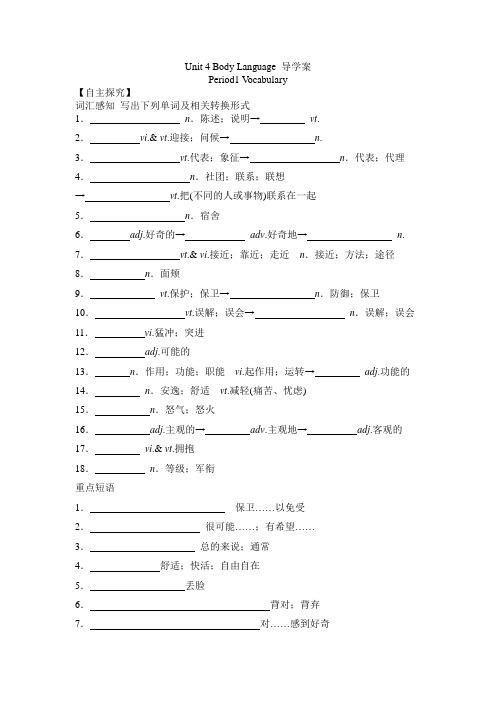
Unit 4 Body Language 导学案Period1 V ocabulary【自主探究】词汇感知写出下列单词及相关转换形式1.n.陈述;说明→vt.2.vi.& vt.迎接;问候→n.3.vt.代表;象征→n.代表;代理4.n.社团;联系;联想→vt.把(不同的人或事物)联系在一起5.n.宿舍6.adj.好奇的→adv.好奇地→n. 7.vt.& vi.接近;靠近;走近n.接近;方法;途径8.n.面颊9.vt.保护;保卫→n.防御;保卫10.vt.误解;误会→n.误解;误会11.vi.猛冲;突进12.adj.可能的13.n.作用;功能;职能vi.起作用;运转→adj.功能的14.n.安逸;舒适vt.减轻(痛苦、忧虑)15.n.怒气;怒火16.adj.主观的→adv.主观地→adj.客观的17.vi.& vt.拥抱18.n.等级;军衔重点短语1.保卫……以免受2.很可能……;有希望……3.总的来说;通常4.舒适;快活;自由自在5.丢脸6.背对;背弃7.对……感到好奇【课堂检测】语境活用(用单词的正确形式填空)1. The PRC ________(代表) the People’s Republic of China .2. They live in the same ________(宿舍).3. At noon ,students are in the _______(食堂) for lunch .4. Their _______(航班) number is 9573.5. Children are _______(好奇) about everything .6. A tourist _______(接近) us and asked us the way to Windsor Castle .7. Their ________(好奇) is good for their future development .8. Tears rolled down his ________(面颊).9. The surgeon is doing a ______(主要的) operation .10.There are different _______(方法) to language learning .11.He _______(误解) his partner and glared at him.12.The film is intended for _______(成人) .13. The most universal _______(面部的)expression ,of course ,the smile .14. The machine ________(运转) well .15. There has been a close ______(联系) between these two companies .16. He________(迎接/问候)all the guests warmly as they arrived.17. She gave her son a________(拥抱)and let him go to bed.学案1课堂检测答案:1.represents/stands for 2.dormitory 3.canteen 4.flight 5.curious 6.approached 7.curiosity 8.cheeks 9.major 10.approaches 11.misunderstood 12.adults 13.facial 14.functions 15.association 16.greeted 17.hugPeriod2&3 Warming up &reading预习案:What is body language?Part 1 Body language is one form of nonverbal ______________(交流) without using words. Eye contact or gaze(注视), facial____________, gestures, and __________ (姿势), or the way you stand, are different kinds of body language.探究案:Reading Communication: No Problem?Part 1 Read this passage within two minutes and answer these two questions. (para2&3) 1.How many characters(人物)are mentioned in our passage. Who are they?2. Do all members of all cultures behave the same way?Part 2 Matching the people and their different ways of greeting (para2&5)Mr Garcia (Columbia) 1.shakes hands and kisses otherstwice on each cheekJulia Smith (Britain) 2.bowsVisitor (Japan) 3.shakes handsGeorge Cook (Canada) 4.approaches others closely andtouches their shoulder andkisses them on the cheekMadame Coulon (France) 5.does not stand very close to others ortouch strangersPart 3: Find out the two mistakes the writer found in the airport:Mr. GarciaHe approaches Ms Smith by _______from ______ ________ and _______ her onThe first the ________.Mistake Julia Smith She ______ ________ appearing _______ andfrom take a few steps _______ ______ Mr. Garcia.Akira Nagata He ________ to Mr. Cook and his nose _________from Mr. Cook’s _______ ________.The secondmistake George Cook He ________ ________ _______ ________ tofrom the Japanese.Conclusion:Different countries have ___________(不同)cultures, so when people greet each other, they will have different_______(方式). If people don’t know the cultural differences well, people may have difficulties in________________(交流)with others throughout the world.训练案:Summary in (金牌学案)Language points预习案:Task1. Translate the following phrases into English:1. 向某人伸手索要________________2. 和某人握手_____________3. 向四周看____________________4. 上下点头__________________5. 避免做某事___________________6. 依靠____________________7. 挠头______________ 8. 与..相似______________9. 对…好奇______________ 10. 舒适,自在______________11. 把某人介绍给某人______________ 12. 代表中国政府______________ 13. 大体上,一般来说______________Task2 金牌学案---导学互动探究案:考点1.curiously adv. 好奇地curious adj.好奇的,求知的,古怪的,爱挑剔的活学活用:1..对你周围的世界感到新奇是件好事。
Unit 4 Don’t eat in class复习导学案

七年级英语下册导学案No.3姓名:__________ 学号:________ 评定等级__________Unit 4 Don’t eat in class.(第一课时)短语归纳1. on time 准时,按时2. listen to …听……3. in class 在课上4. be late for 做……迟到5. have to 不得不6. be quiet 安静7. go out 外出8. do the dishes 清洗餐具9. make breakfast 做早饭10. make (one’s) bed 铺床11. be noisy 吵闹12. keep one’s hair short 留短发13. play with sb. 和某人一起玩14. play the piano 弹钢琴15. have fun 玩得高兴16. make rules 制订规则用法集萃1. Don’t + 动词原形+其他,不要做某事2. help sb. (to) do sth. 帮助某人做某事3. too many + 可数名词复数太多的……4. practice doing sth. 练习做某事5. be strict with sb. 对某人要求严格6. be strict in sth. 对某事要要求严格7. leave sth sp. 把某物忘在某地8. keep + 宾语+形容词使……保持某种状态9. learn to do sth. 学会做某事10. have to do sth. 不得不做某事经典句型必背1. Don’t arrive late for class. 上课不要迟到。
2. Can we bring music players to school? 我们可以带音乐播放器到学校吗?3. And we always have to wear the school uniform. 并且我们总是不得不穿校服。
级英语导学案(第四单元).2
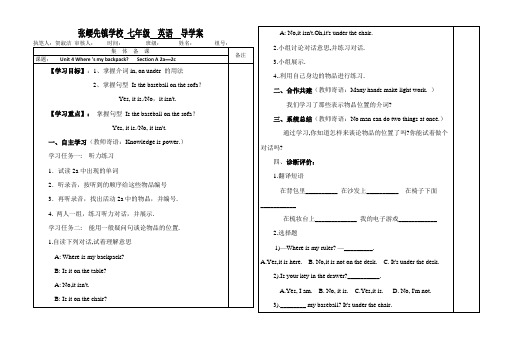
3)—Is the ball under the chair? —No, the ball isn't.
4)—Is the baseball in the case? —Yes, its'.
3).________ my baseball? It's under the chair.
A.Where B. Where's C.Where're
4)—Is the baseball on the desk? —Yes,______is. A. theyB. itC. the baseball
5)—Where _______ Tom's books? —They're _______ the floor.
3)Where is the pencil case? Is it ______ (在…里面)the backpack?
4.翻译句子
1)我的数学书在哪里?
_______________________________________?
2)他的棒球在哪里?在桌子下面.
_______________________________________?________________.
张崾先镇学校七年级英语导学案
执笔人:贺淑洁审核人: 时间:班级: 姓名: 组号:
集 体 备 课
备注
课题:Unit 4 Where 's my backpack?SectionA2a—2c
【学习目标】:1、掌握介词in, on under 的用法
Unit 4 Do it yourself Self-assessment导学案1 (含答案)译林牛
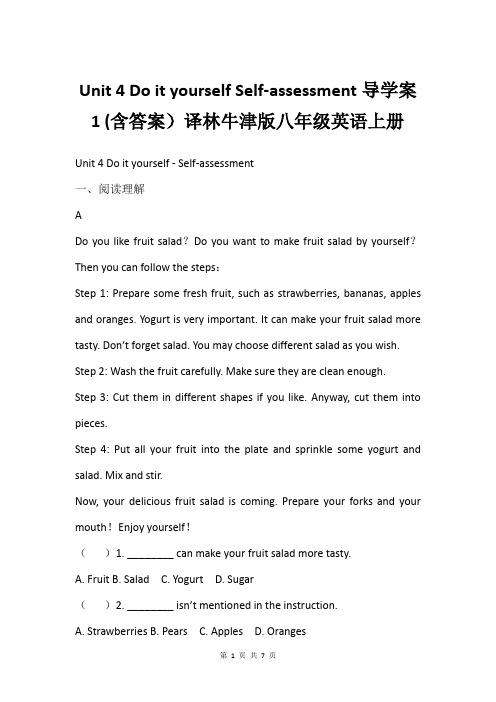
Unit 4 Do it yourself Self-assessment导学案1 (含答案)译林牛津版八年级英语上册Unit 4 Do it yourself - Self-assessment一、阅读理解ADo you like fruit salad?Do you want to make fruit salad by yourself?Then you can follow the steps:Step 1: Prepare some fresh fruit, such as strawberries, bananas, apples and oranges. Yogurt is very important. It can make your fruit salad more tasty. Don’t forget salad. You may choose different salad as you wish. Step 2: Wash the fruit carefully. Make sure they are clean enough.Step 3: Cut them in different shapes if you like. Anyway, cut them into pieces.Step 4: Put all your fruit into the plate and sprinkle some yogurt and salad. Mix and stir.Now, your delicious fruit salad is coming. Prepare your forks and your mouth!Enjoy yourself!()1. ________ can make your fruit salad more tasty.A. FruitB. SaladC. YogurtD. Sugar()2. ________ isn’t mentioned in the instruction.A. StrawberriesB. PearsC. ApplesD. Oranges()3. Your fruit can be in ________.A. the same shapes and piecesB. the same shapes and halvesC. different shapes and piecesD. different shapes and halves()4. There are ________ steps in the instruction.A. threeB. fourC. fiveD. six()5. The best title of the passage may be ________ .A. Delicious fruit saladB. How to choose fruitC. How to make fruit saladD. Enjoy yourselfBDIY is very popular in China now. Yang Chen works for a computer business in Beijing. Though he enjoys his work, it is hard for him to relax (放松)after work.“For a long time, I had no choice(选择)except going to a bar for a drink and karaoke to relax myself,”he said.One day when he saw many toy dogs in a toy shop, he had an idea.“Why not do some kinds of things and relax myself?”Then he began to make model planes, model ships and something else. The things that he had made by himself didn’t look as professionally(专业地)made as those in the shops, but he liked doing it.“It is not as much fun to play with things which are bought expensively from the shops,”he said. Now hisbookshelves are full of many kinds of things he has made. They are very beautiful, and his family and friends like them very much.More and more young people are like Yang, making or creating(创造)things on their own. They like to do them themselves.Though making things with our own hands may take much time, some people, now known as DIYers—do-it-yourselfers, enjoy doing them very much. They can make all kinds of things they like. DIY is becoming more and more popular in China. It may be new to the young, yet many people remember when it was a way of life.During the 1960s and 1970s, when there were not enough living things for people to live on, they had to use their own hands to do many things. Whitewashing the wall or making clothes was a part of life because there was no other choice. If you wanted something done, you had to do it yourself; and if you needed something, you made it yourself.()6. Yang Chen ________ in his free time in the past.A. played computersB. went to a bar for a drink and karaokeC. enjoyed his workD. made something by himself ()7. Things that Yang Chen made ________ .A. look as professionally made as those in the shopsB. are much more expensive than those in the shopsC. are popular with his family and friendsD. are only model planes and ships()8. Many young people like making things by themselves because ________.A. they want to make more moneyB. they do them for funC. there are not enough living things for them to live onD. they can’t buy them anywhere()9. Which of the following is TRUE according to the passage?A. DIY is becoming more and more popular in China.B. More and more people begin to make model planes.C. Between the 1960s and 1970s, people liked making things themselves.D. More and more young people are like Yang Chen.()10. The main idea of the passage is ________.A. Yang Chen has a new hobbyB. how young people create new thingsC. DIY is a good way of lifeD. DIY was a part of life in the past二、完形填空The DIY is very popular with us today. But what’s DIY?DIY 1 “do-it-yourself”. It is very new and fashionable. In my 2 , I believe it is a very good thing. First, it can give you real 3 in doing something or making something and this experience is very helpful.4 , it is a good way5 your own idea. You can realize your idea by DIY,6 , you can make a cake or dish by your own idea. What’s more, today, by DIY, we can7 the happiness from it and get the sense of success or achievement by DIY. When you8 some time doing DIY, you can have fun doing it and when it9 , you will be very excited. Finally, 10 is a good way to reduce cost when we make something. All in all, it is a very good thing and suitable for many youth.( ) 1. A. short for B. stands for C. instead of D. takes place ( ) 2. A. dream B. happiness C. opinion D. project( ) 3. A. chance B. choice C. abilities D. experience( ) 4. A. Besides B. Beside C. On the other hand D. Except ( ) 5. A. express B. expressing C. to express D. expressed ( ) 6. A. by the way B. in a word C. for example D. such as( ) 7. A. enjoy B. learn C. encourage D. change( ) 8. A. cost B. spend C. take D. pay for( ) 9. A. finished B. is finished C. has finished D. will be finished( ) 10. A. DIY B. opinion C. experience D. success(二)根据所给汉语完成下列句子:1.你最好把房子涂成白色。
u4-Body-language-导学案
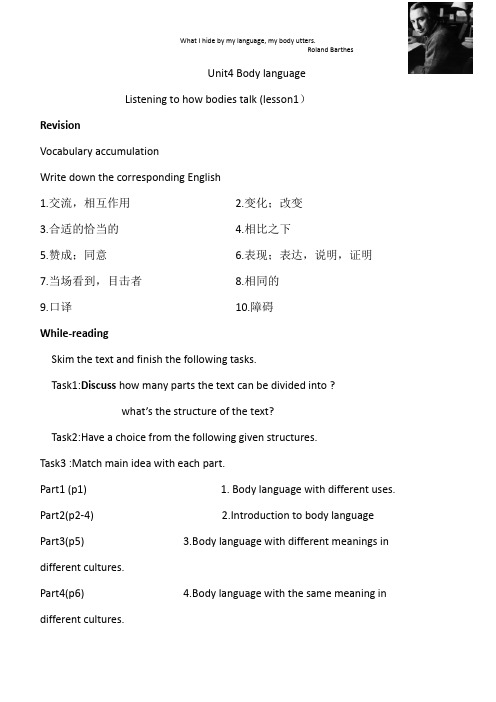
Unit4 Body languageListening to how bodies talk (lesson1)RevisionVocabulary accumulationWrite down the corresponding English1.交流,相互作用2.变化;改变3.合适的恰当的4.相比之下5.赞成;同意6.表现;表达,说明,证明7.当场看到,目击者8.相同的9.口译10.障碍While-readingSkim the text and finish the following tasks.Task1:Discuss how many parts the text can be divided into ?what’s the structure of the text?Task2:Have a choice from the following given structures.Task3 :Match main idea with each part.Part1 (p1) 1. Body language with different uses. Part2(p2-4) 2.Introduction to body language Part3(p5) 3.Body language with different meanings in different cultures.Part4(p6) 4.Body language with the same meaning in different cultures.Intensive readingActivity1: According to para1 answer the question.Activity2:Translation exercise.1.We use both words and body language to express our thoughts and and opinions in our interactions with other people.2.Words are important,but the way people stand ,hold their arms,and move their hands also can give us information about their feelings.P2-4Fill in the following table after reading the passages from para2-4.Body language/gesture Meaning Country/regionEye contact between menand womenLooking down whentalking to someoneOk signKissing on the cheekPara5Task1: Try to recite the first two sentences and then fill in the blanks according to the hints(提示).S1:Some gestures ___ ____ ____ (似乎有)everywhere.S2: _____ (放置)your hands together and ___(依靠;搁置)them on the side ofyour head while____ ___ ___(闭着你的双眼)means sleep.Task2:Judge whether it is True or False(F)according to para5 and para 61.A good way of saying “I am hungry” is moving your hand in circles over your stomach after a meal.( )2.Some body language has many different uses.( )Para6Read and judge.Q: Which of the following is not true according to p6?( )A. A smile can help us get through difficult situations.B. A smile can help us find friends in a world of strangers.C. We can’t use a smile to apologise.D. We can use a smile to greet someone, to ask for help ,or to start a coversation.Appreciate a sentenceAnd if we are feeling down or lonely(从句)there is nothing better than seeing the smiling face of a good friend.(主句)(比较级用于否定句中表示最高级的含义)Post readingBody language is one of the most___ (power)means of communication and it ___(vary) from culture to culture,but it is safe ___(follow) the golden role -when in Rome,do as the Romans do.Summary and homeworkDifferent countries have different cultures and body languages.But whatever it is, being a positive and polite person ,your world will be more and more beautiful. Homework:Exercise 1-3 on page40。
- 1、下载文档前请自行甄别文档内容的完整性,平台不提供额外的编辑、内容补充、找答案等附加服务。
- 2、"仅部分预览"的文档,不可在线预览部分如存在完整性等问题,可反馈申请退款(可完整预览的文档不适用该条件!)。
- 3、如文档侵犯您的权益,请联系客服反馈,我们会尽快为您处理(人工客服工作时间:9:00-18:30)。
课题Unit 4 What Can You Do? 课时第1课时总课时学习目标1能够听、说、读、写词组:cook the meals, sweep the floor, clean the bedroom, water the flowers, empty the trash.2听懂、会说句型:I’m helpful. I can….并能在具体语境中运用这个句型进行交谈。
3每个同学都要感受到=劳动的光荣,热爱劳动,增强自己的生活自理能力。
学习重难点1.重点是有关家务劳动的五个动词词组cook the meals, sweep the floor, clean the bedroom, water the flowers, empty the trash的听说读写。
2.难点是正确书写四个动词词组及运用句型I can …课前准备师生共同准备本课时的六张单词卡。
老师准备录音机和录音带:学法指导创设情境、对话教学学习过程基本环节学案导案自主学习Let’s start1、观看书本第44面的Let’s start部分的flash动画,自己谈谈自己听明白了什么?用汉语介绍给全班同学听。
大家相互补充说明,最后由老师评定start的具体意思。
Let’s learn1、自己试读单词:sweep the floor,cook the meals,clean the bedroom,water the flowers,empty the trash.不认识的凭自己学习过的辅音和元音进行单词拼读。
Warm up(热身)1) Chant and act2)介绍学习目标合作探究2、自己不能认读的单词,学员在小组内进行讨论、试读。
3、小组长可直接向老师请教,然后检查并解决本小组不会读的词老师要对单词进行讲解和领读。
采取个人读、小组读等各种读法,对单词进行认读巩固。
Let’s chant1、播放英语空中课堂视频,进行跟读Dog,dog,what can you do? I can run after you.Panda,panda,what can you do? I can eat so much bamboo.Mouse,mouse,what can you do? I can hide in the shoe.\Mike,Mike,what can you do? I can draw animals in the zoo!2、自己试着发表自己对chant的理解,能说出它的汉语意思。
3、再从语音、语调上进行模仿跟读,直至达到可以跟随音乐节奏进行熟练说唱。
1、播放课件或录音,让学生先视听后跟读。
2、布置任务。
让小组长安排组内成员任务并交流,负责检查或交换批改。
3、追问、点拨、更正、归纳、评价。
A. 词量较多,注意单词的拼读B.做游戏操练新单词,抢拼单词,拼读时小组成员可提供帮助。
展示交流自认为自己所在的小组很了不起,能够在大家面前展示的,就大胆地自主站起来表演给大家看!对出错单词及时纠正拓展延伸①、教师说短语,全体学生做动作。
②、个别学生发指令,其他学生做动作。
或者由其它小组组长对另外一组进行发号施令,另外一小组成员必须快速完成动作并能同时说出短语的汉语意思。
当堂检测1、完成本单元配套的活动手册。
2、听、读课文。
对本课基础知识的检测。
小组合作核对答案。
并对有质疑的题目进行探究讨论,对有分歧的题目可请教老师来帮忙。
反思提升我的收获或疑惑:______________________通过同学们的总结,老师作适当的补充。
自我评价对自己做出评价五年级英语科导学案课题Unit 4 What Can You Do? 课时第2课时总课时学习目标1能听懂、会说“Are you helpful at home? What can you do? You’re helpful.”等句型,并能在实际情景中进行运用。
2看懂C Good to know明白生活中的安全知识、环保知识,做“环保小卫士”。
新课标第一网学习重难点重点是句型:What can you do? Ican---难点是句子:Are you helpful at home?课前准备录音机及磁带词卡对话的头饰学法指导创设情境、对话教学学习过程基本环节学案导案自主学习1、听有关书本第47面的Let’s try部分的flash.自己看书校对,自我检查一下,小组长核对,老师进行评定,每一位学生要做好修正笔记1、出示学生预习课本中第47页对话,以小组为单位进行简单的交际性问答。
4、布置任务①让学生把对话通读一遍,标记出重难点地方。
②让学生完成预习单合作探究不认识或陌生的单词:1、教师在出示完图片后,出示Let’s talk部分视频,此过程中,学生解决自己不认识的单词及词组单词:______________________________________句型:_____________________________________ _____________________________ _____________________________________ ____________________________2、组长帮助学员学生预习,帮助他们认读生词,生句。
3、小组进行交流,能够朗读短文三、自我展示团体创作再次观看Let’s talk的视频flash,自主跟读二遍小组活动1、小组成员每一个人都能句朗读短文;2、小组长辅导读得不熟练的同学,可进行个人教读,也可以进行先会者教后会学生1、播放课件或录音,让学生先视听后跟读。
2、布置任务。
让小组长安排组内成员任务并交流,负责检查或交换批改。
3、追问、点拨、更正、归纳、评价。
型。
展示交流认为自己所在的小组很了不起,能够在大家面前展示的,就大胆地自主站起来表演给大家看!对出错单词及时纠正拓展延伸以四人小组为单元,其中一位同学为招聘人员,其他三位为应聘人员。
用上所学句型“Are you helpful at home? What can you do?”&“I’m helpful. I can ….”当堂检测1做本单元配套A Let’s talk部分活动手册。
2听、读Let’s talk。
对本课基础知识的检测。
小组合作核对答案。
并对有质疑的题目进行探究讨论,对有分歧的题目可请教老师来帮忙。
反思提升我的收获或疑惑:______________________通过同学们的总结,老师作适当的补充。
自我评价对自己做出评价五年级英语科导学案课题Unit 4 What Can You Do? 课时第3课时总课时学习目标1. 1听懂、会说“Mother Goat is ill. We can help her. OK, just do it!”等句型。
并能在情景中运用。
2. 2巩固四会句子“What can you do? I can ….”3. 3学唱歌曲《I Can Help 》学习重难点重点是掌握句型:What can you do? Ican---难点是掌握四会句型的书写课前准备头饰、录音带、课件学法指导创设情境、单词教学学习过程基本环节学案导案自主学习1、自主预习英语短文,找出不认识的单词或句子单词:______________________________________句型:_____________________________________ _____________________________ _____________________________________ ____________________________ Warm up(热身)1) Chant and act2)介绍学习目标合作探究2、组长帮助学员学生预习,帮助他们认读生词,生句。
3、小组进行交流,能够朗读短文(老师进行解读,此时学生应做到相应的笔记,同时要完全解决自己预习中出现的生词,生句甚至疑问)1、播放课件或录音,让学生先视听后跟读。
2、布置任务。
让小组长安排组内成员任务并交流,负责检查或交换批改。
3、追问、点拨、更正、归纳、评价。
A.在呈现过程中,师生一起拼读生词中的四会单词。
学生进行单词拼写比赛,边写边读,看谁既快又好,以帮助记忆本课时四会单词。
B.引导学生想一想哪些水果或食品对人体健康有益,当学生说出这些水果或者蔬菜时,自然引出新单词并多次强调感知。
展示交流自认为自己很棒,能够流利,有感情地朗读短文的同学,可以自主站起来,给全班的同学展示自己的风采!对出错单词及时纠正拓展延伸Look ,write and say.当堂检测1独自完成下列句子①、What can the monkey do? He can②、What can the rabbit do? She can③、What can Zip do? She can④、What can Zoom do? He can2、自主板书自己的答案3、能够把问答进行朗读。
对本课基础知识的检测。
小组合作核对答案。
并对有质疑的题目进行探究讨论,对有分歧的题目可请教老师来帮忙。
反思提升我的收获或疑惑:______________________通过同学们的总结,老师作适当的补充。
自我评价对自己做出评价五年级英语科导学案课题Unit 4 What Can You Do? 课时第4课时总课时学习目标1. 1掌握四会词组:wash the clothes, set the table, make the bed, do the dishes, put away the clothes.2. 2能够听懂并运用所学词组,也可结合以前的内容,如:go to the kitchen, set the table.3. 3会读、说“Can you …?”句型并能用“Can you do housework?”来询问了解他人的日常生活自立能力及相应的回答“Yes. I can.”。
4. 4能听懂Let’s chant的歌谣,并按节奏来念。
5. 5培养学生爱劳动的观念,鼓励学生多做自己力所能及的事。
学习重难点重点是掌握Let’s learn中的词组;难点为理解并能正确用本课句型替换词组.教学准备课前准备录音机及磁带词卡纸张CAT学法指导创设情境、对话教学学习过程基本环节学案导案自主学习Let’s learn1、自己试读单词:wash the clothes, set the table, make the bed, do the dishes, put away the clothes.不认识的凭自己学习过的辅音和元音进行单词拼读。
布置任务①让学生把对话通读一遍,标记出重难点地方。
